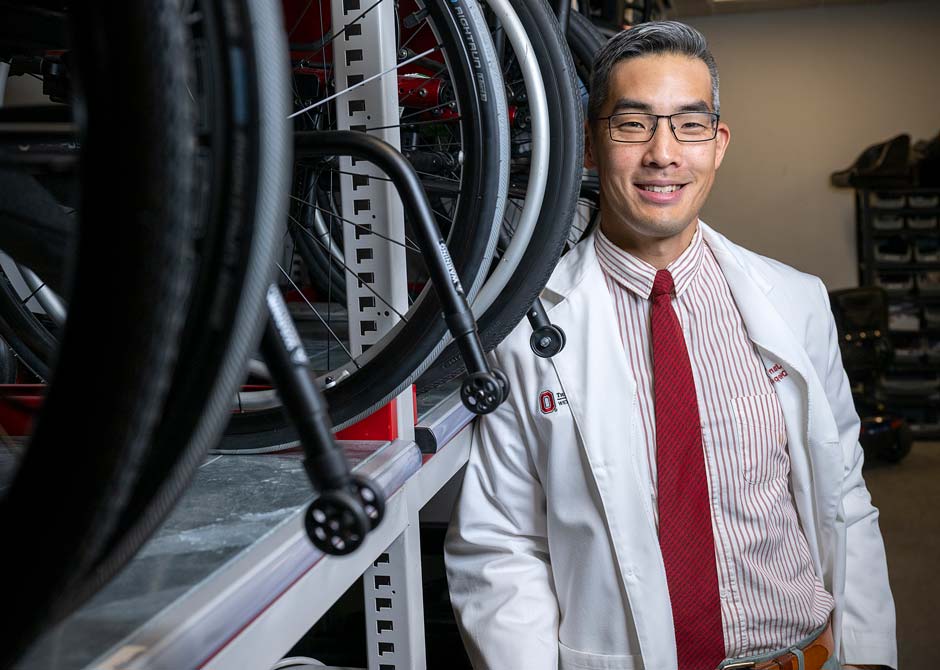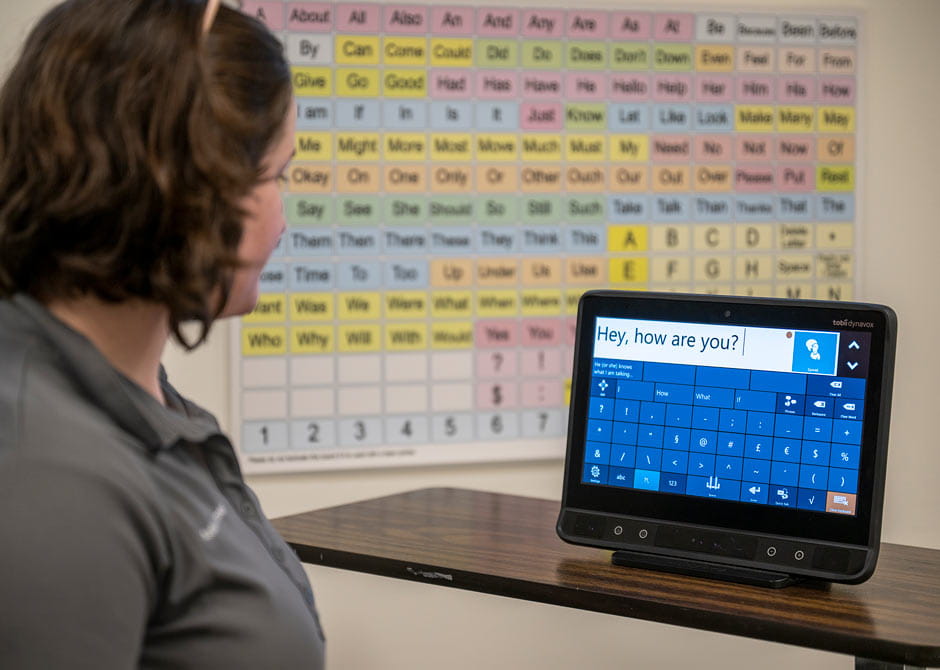 When an illness or an injury causes you to lose function or mobility, it can be reassuring to know that there are many assistive technology devices and services that can help you live to your fullest potential. But it can also be confusing and overwhelming to sift through all the various options and make decisions about what will work best for your unique condition and situation.
When an illness or an injury causes you to lose function or mobility, it can be reassuring to know that there are many assistive technology devices and services that can help you live to your fullest potential. But it can also be confusing and overwhelming to sift through all the various options and make decisions about what will work best for your unique condition and situation.
The physical medicine and rehabilitation experts and specially trained therapy staff at The Ohio State University Wexner Medical Center in Columbus, Ohio, can help you navigate finding the technology that will be most beneficial to you. We’re also home to a 5,000-square-foot facility dedicated to assistive technology, giving you access to the latest and most customized devices. We can be a trusted partner in your recovery, no matter where you are on your rehabilitation journey.
What is assistive technology?
Assistive technology generally refers to any device, product or system that helps people with disabilities maintain or improve function to be able to complete everyday tasks, work, go to school and participate in favorite activities.
At the Ohio State Wexner Medical Center, our assistive technology program focuses on providing customized assistance for people with physical, cognitive or sensory disabilities. Our goal is to help each person regain function and achieve a higher level of independence through the improved use of technologies. We specialize in helping people use these assistive devices, which are personalized to meet each individual’s needs:
- Wheelchairs
- Scooters
- Specialized computer equipment
- Communication devices
- Vehicles with modifications
- Smart technology
Typically, assistive technology services don’t encompass wearable devices, such as braces or splints, and those types of items are referred to as rehabilitation technology. These devices are offered at Ohio State, just by other specialists who we will connect with, if needed.
Ohio State’s assistive technology program
The assistive technology services program at the Ohio State Wexner Medical Center is nationally recognized for the comprehensive, innovative and compassionate services we provide across all levels of care.
The program provides rehabilitation expertise to help you at each phase of your rehabilitation, from services offered in the hospital (inpatient services) to those offered after returning home (outpatient services). These services help you achieve your highest level of recovery.
We’re one of the only assistive technology programs in the region that has a dedicated physician team, and our high approval rates lead to better outcomes. Here’s how we’ll serve you at each stage of care:
Acute rehabilitation while still admitted to main hospital
Immediately following surgery or the stabilization of your condition, you’ll begin learning what might be available in terms of assistive technology as you recover. We work diligently with our acute rehabilitation team and case managers to ensure that they’re aware of the services we offer in assistive technology and that they can relay that information to patients and their families.
Inpatient at Dodd Rehabilitation Hospital
At Dodd Rehabilitation Hospital, our physical medicine and rehabilitation experts will begin collaborating with our team to determine what immediate and long-term devices and systems you might require to make a successful transition home or to the community. During your stay at our award-winning rehabilitation hospital, you’ll have access to the latest advancements in assistive technology to benefit your recovery and plan for your discharge. You’ll be able to test out equipment, such as wheelchairs, to ensure you have access to the proper devices when you begin outpatient rehabilitation care.
Outpatient assistive technology services
Our 5,000-square-foot facility is dedicated specifically to assistive technology services for patients, including individualized evaluation, equipment trial and training. We make it very easy for people to navigate insurance to get what they want – in fact we have one of the quickest evaluation-to-delivery timelines nationwide, getting you the equipment you need faster.
And you don’t need to come from our acute or inpatient care to have access to outpatient assistive technology services. Typically, referrals are needed for our services but not always. Check with your physician to be sure.

Assistive technologies and expert care help patients achieve optimal mobility and freedom
A main goal of the assistive technology team at Ohio State is to find solutions for people who may have lived for years with limited mobility or devices that cause pain or aggravation.
Who is a candidate for assistive technology services?
There are many reasons why someone might need assistive technology to improve their quality of life. Some of the more common conditions we see in assistive technology services at Ohio State include:
- Brain injury
- Cerebral palsy (a chronic condition affecting body movement and muscle coordination)
- Neurological diseases (including ALS, multiple sclerosis and muscular dystrophy, spinal muscular atrophy)
- Spinal cord injury
- Stroke
- Intellectual disabilities
Just because your condition isn’t on this list doesn’t mean you won’t be able to benefit from an assistive technology device. We’ll collaborate with your medical and rehabilitation teams to determine if assistive technology services would be an advantageous addition to your overall treatment plan.
Assistive technology services offered at Ohio State

Following your physician's referral, you’ll participate in a comprehensive evaluation allowing us to review your rehabilitation needs and goals. Then, we will design a personalized program for you that may include:
Augmentative and Alternative Communications (AAC)
AAC refers to communication methods beyond verbal speech that can help those with communication impairments express their thoughts, needs, wants and ideas. AAC can either supplement speech or replace speech entirely, depending on the person’s needs.
Driving evaluation and training
Our Driver Rehabilitation Program evaluates a person's current driving abilities, assesses driving potential, recommends vehicle modifications and provides driver training that enables an individual with a medical condition to be a safe and independent driver. Our services include clinical evaluations, simulator training and on-road evaluations and training. For individuals with progressive medical conditions, such as Alzheimer's disease, we offer driver retirement planning resources.
Smart Clinic
The Assistive Technology Center Smart Clinic is a demonstration lab that provides opportunities to try various adaptive technologies to access mainstream devices, such as phones, computers, video games and smart home devices. Access to computers, electronic aids to daily living and other technology can offer greater independence with daily activities at home, school, work and community activities.
Wheelchair Seating and Mobility Clinic
Wheelchairs can assist with your ability to access your home, work and community. Positioning and cushion evaluations help with comfort and protection in manual wheelchair and power wheelchair seating. At our Wheelchair Seating and Mobility Clinic, we assess your needs and work with our accredited wheelchair suppliers to provide you with the most appropriate equipment and mobility skills training.
Your assistive technology services team
Your customized treatment plan is implemented by a team of specialists who may include:
- Assistive technology professionals who specialize in the selection and proper use of appropriate assistive devices, such as wheelchairs, braces and special computer equipment
- Occupational therapists who specialize in improving patients' ability to complete activities of daily living
- Physical therapists who specialize in helping patients achieve maximum strength, balance and mobility
- Rehabilitation engineers who specialize in assistive technology devices, such as wheelchairs, special computer workstations and remote-control systems, and in fitting and training patients with these devices.
- Speech-language pathologists who specialize in helping patients improve communication, cognition and swallowing
- Driving rehabilitation specialists who specialize in driver training for those with disabilities
- Social workers who specialize in the social, emotional and financial needs of families and patients
Why choose Ohio State for your assistive technology needs?
People from across the Midwest choose Ohio State’s assistive technology services to help them regain function and independence for many reasons. Here’s why:
Personalized care: Our team of specialists excels at assessing and recommending customized, assistive devices for each individual. You will receive a personal evaluation that helps create a care plan to meet your needs and leads you toward your health goals.
Unique services: You’ll benefit from our relationships with top assistive technology manufacturers, who turn to us to test and evaluate their new products, giving you access to the latest and greatest advancements in assistive technology.
Certified excellence: Ohio State’s assistive technology professionals are certified in specialty areas of practice related to their profession. Our staff members are certified by the Rehabilitation Engineering and Assistive Technology Society of North America (RESNA). This certification assures the highest quality and clinical standards. We also have five certified Assistive Technology Professionals (ATP) – the most ATP-certified staff of any program in the region.
Convenience: Our 5,000-square-foot facility is dedicated specifically to assistive technology services for patients, including individualized evaluation, equipment trial and training. We make it very easy for people to navigate insurance to get what the want – in fact we have one of the quickest evaluation-to-delivery timelines nationwide, getting you the equipment you need faster.
